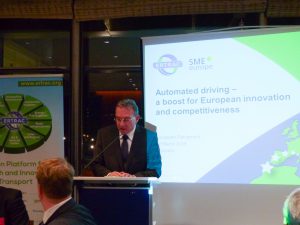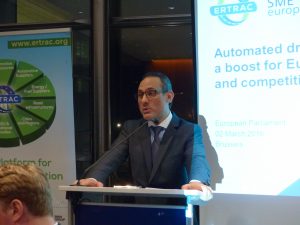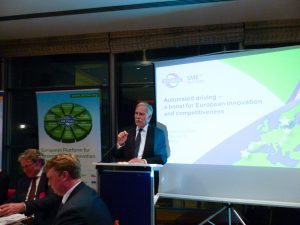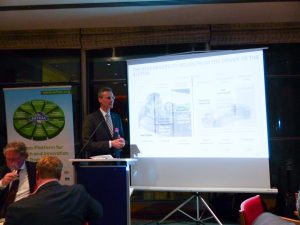Automated driving-a boost for European innovation and competitiveness
On 2nd of March 2016, SME EUROPE in collaboration with ERTRAC hosted a working dinner in the European Parliament on the matter of automated driving and the opportunities/risks the development of such technology could affect the European market both socially and economically. The speakers were preceded by a short note of welcome from the Executive Director of SME EUROPE Dr. Horst Heitz.
Iuliu Winkler MEP spearheaded the discussion by leading an informative introduction to the issue at hand. He pointed out that Carmakers, tech companies, and innovators in many sectors of the digital economy are throwing their efforts into automated vehicles, and that In the very near future, these vehicles will not need drivers to take an active role, instead, they will scan their environment and communicate with other vehicles and with traffic management systems. Mr. Winkler showed an interest in the Geneva motor show, where many automated driving concepts are currently being showcased in order to attract investment.
Ismail Ertug took the stage to conclude the welcome stage of the discussion by drawing attention to the public view of automated driving. He opened by informing the participants that the German media is focusing significant attention on the development of this concept. Mr. Ertrug went on to say that automated driving is already in effect, as we can see with onboard navigation systems and parking assistance measures. He went on to say that by 2030, we can expect to see huge advances made towards the automated driving research concept twinned with a substantial reduction in C02 output. Despite all these technological advances, Mr. Ertrug is concerned by the EU´s lack of attention when it comes to developing the relevant safety and legal frameworks in this sector, he is concerned to such an extent, that he has prepared a written question to be posed during the next Strasbourg plenary session concerning liability law and how the Vienna Convention should be clarified as well as the previously mentioned issues. Mr. Ertrug added as a closing remark that connectivity and communication between infrastructures is essential if this project is to succeed.
After these welcome words and food for thought, our own Executive Director Dr. Horst Heitz warmly welcomed the present SME EUROPE members including Ivan Stefanec and Iuliu Winkler as well as the Table Hosts for the evening; Salvatore Domenico Pogliese MEP and Isabella De Monte MEP.
Dominique Riquet MEP opened for the Keynote Speakers by making very clear that he believed that at whatever cost, the transport sector must remain competitive, and on this basis, who will lead this revolution on the technological field, the suppliers, the designers or the insurance companies? He claimed that in light of these changes in the automotive sector, insurance schemes and frameworks must be revisited and revised. Mr. Riquet then began to highlight his concerns regarding automated driving; he believes firstly that it will be a very difficult feat to attract investment in longterm automated infrastructure and he also worries about the impact automated driving may have on an already very sensitive economy where technology is phasing out human input on many levels. He points out that many driving careers such as taxiing, emergency response services and delivery will be put at risk and potentially lost through the development of such technology.
Stephan Neugegaber subsequently occupied the podium and spoke of not only communication between private undertakings and decision makers throughout the development process but the essentiality of engaging the general public in a dialogue throughout the update procedures over the coming years. According to Mr. Negebauer´s slideshow we could expect to see an extreme drop in road related deaths and casualties and reduced congestion on roads as a direct result of the implementation of automated vehicles on the European roads, automated vehicles would also enable mobility to those unable to drive conventionally such as the blind, deaf and the disabled. Mr. Neugebauer reminded the participants that the change to automated driving would not simply be an overnight phenomenon but rather a long and rather challenging road to such a harmonization project. He also pointed out as earlier remarked that this transformation is already underway with the introduction of distance control and parking assist, we can expect to see much more human responsibilities at the wheel pass to the control of sensors and self-aware software, or as Mr. Neugebauer put it so eloquently phrased it “hands off, feet off, eyes off and eventually, minds off”. In contradiction to Mr. Riquet, Mr. Neugebauer argued that millions of jobs will be created through this infrastructure project alone, especially in the telecom industry and in the production of new applicable software and sensors. Mr Neugebauer argued that an effectively bomb proof communication system on all levels, from production to coordination on the roads is absolutely essential if this project intends to be a success, he also conceded that there are of course issues that need to be addressed including matter of security in terms of data sharing and security. Mr. Neugebauer finished up by re-affirming that the automotive industry forms the backbone of European industry.
Finally, we had the pleasure of welcoming Majolijn Sonnema, Deputy Director General for Mobility and Transport and part of the Ministry of Infrastructure and Environment in the Dutch Presidency. Mrs. Sonnema informed the participants of the steps taken by the Netherlands to break down barriers impeding the progression of automated driving development. The Netherlands remains the only EU Member State where the testing of automated vehicles is legal on public highways. She re-affirmed that the collaboration of different industry sectors is essential and that she is very proud that the Dutch Presidency is leading the way in the development of the programme through its presidency agenda in the Council of Ministers.
The discussion was at this point opened for general questions from all other participants. Concerns were raised concerning data and telecom requirements, a representative from Orange confirmed that this was an issue which required amalgamation of technology which would hopefully lead to the self-awareness required for vehicles to become fully autonomous on the roads. Another issue raised, was the fact that the EU as an economy is lagging behind other key economies such as South East Asia and the USA in the development of big data. This was addressed and plans for the development of a 5G roadmap were explained which should enable to assist the EU economy in keeping up with development in this field.





